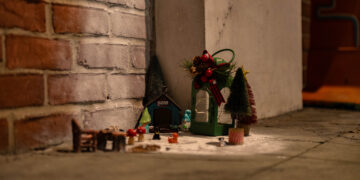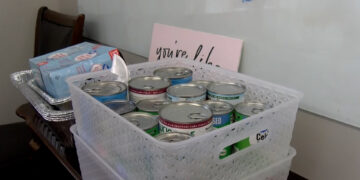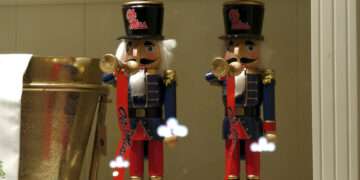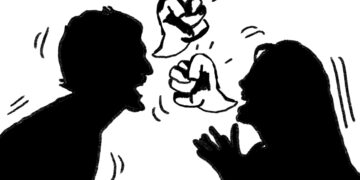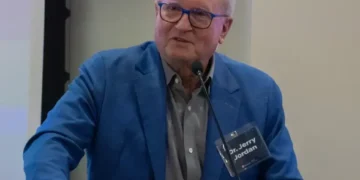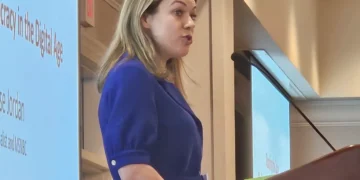Poet Joshua Nguyen likes to keep tidy — so much in fact that he wrote a whole book about it. Yet it isn’t the most radical thing he’s done in regards to cleanliness.
“When I was in undergrad I would tell my roommate to not let anyone sit in my bed,” Nguyen said. “Just to see if he would let people, I put thumbtacks under the covers.”
Keeping perhaps too clean was an issue for him in the past until “Tidying Up with Marie Kondo” aired on Netflix in 2019.
Kondo’s story somewhat mirrors Nguyen’s. After having a breakdown related to her own issues with orderliness, she realized that she needed a shift in focus. Instead of thinking about what she could throw away, she instead began to think about what she could keep and what objects make her the happiest.
“Marie Kondo has taught me how to organize my life,” Nguyen said, “and, even more, organize my thoughts.”
After hearing her story and philosophy on orderliness, Nguyen was struck with a question: “What if this was more metaphorical?” The main idea for “Come Clean,” his upcoming debut book, was born.
Taking from the quotidian of domestic life, Nguyen hopes to use this collection of poems to assemble a portrait of someone trying to organize and compartmentalize facets of their inner world as well as their exterior environment. Poems show childhood trauma and long-held memories come to clash with the ideas of Marie Kondo as the protagonist asks if they can scrub and clean away their past as easily as their floorboards.
“I think this idea of ‘coming clean’ works really well because it speaks to his love of cleaning as well as his hesitation to be honest about what he is feeling,” Nguyen’s roommate and peer Noel Quiñones said.
The book also deals with Nguyen’s attempt to create a vision of something he hasn’t seen in poetry, or other media, for as long as he can remember.
“I haven’t seen an Asian American masculine-presenting body inhabiting a very domestic space that’s associated with femininity,” Nguyen said. “I want my body to be associated with that too.”
While publishing the book, he’s also been pursuing a Ph.D. at the University of Mississippi. Assisting professors, managing his book’s publicity, and keeping up on his readings for class have proven challenging, but he still manages to fit in readings and book tours every now and then.
In his off time, however, Nguyen still finds his time to tidy up and flex his wordsmithing skills. His office is neatly adorned with photos of friends as well as artwork he’s come to collect over the years. On one wall, a gifted artwork depicting the 1997 film “Princess Mononoke,” on another, a cut out snippet of one of his poems.
When cooking with the Oxford Canteen, his former boss Corbin Evans recounted how he would play word games to keep everyone engaged.
“He’d always do them with new workers,” Evans said. “They would think about their favorite word and everyone would try to guess it. Joshua would usually be the one to get it right.”
Another one of Nguyen’s fascinations is with boba tea. To Nguyen, boba isn’t just his favorite guilty pleasure. In some ways, he sees the treat as endemic to his very status as an Asian-American.
“Boba is cool because the history is that it wouldn’t have happened without British colonialism,” Nguyen said. “There’s this tension that without that violence we wouldn’t have it today. When I talk about boba and myself, I think of the hyphen in Asian-American and how that hyphen combines my roots in the States and my Asianness that I can’t escape.”
This “hyphen” spreads to other areas of his poetry. In both his earlier and more recent publications, Nguyen plays with the lục bát, a poetic form native to Vietnam. However, bringing the form from a monosyllabic language to a polysyllabic language meant tweaking the formula a bit. He calls the new form the “American lục bát.”
“At first I got some flac,” Nguyen said. “I talked to my Vietnamese friends and some were supportive while others didn’t know if it would work. I think there is a nuance there…I, as an Asian-American kid, took this very traditional form and twisted it for the English language. I think there’s a nuance in that I might still be enacting this violence in a sense. It’s me trying to figure out and deal with an Asian body in a violent American state. I did the American thing of taking something and changing it to be palatable, but I also did the Asian thing of connecting to my roots and paying respect to Vietnamese history…It’s a lot like Boba!”
Nguyen’s book “Come Clean” releases on Oct. 5 and can be purchased from The University of Wisconsin Press. Jan. 21. Off Square Books will host a reading of the book. A former slam poet, he’s currently working on his PhD at the University of Mississippi. His favorite flavor of boba tea is Oolong.

